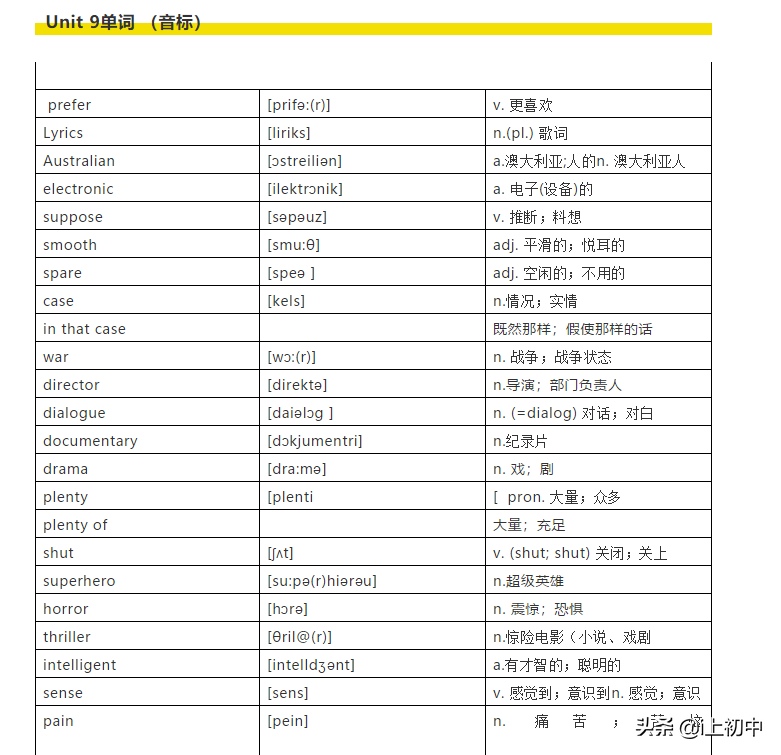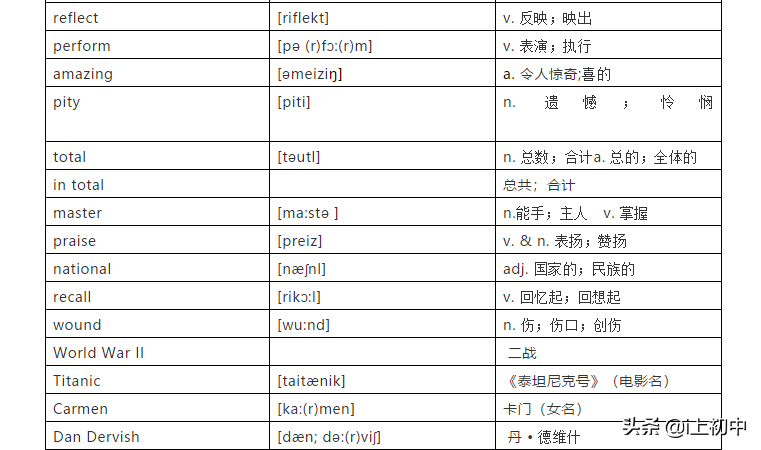Unit9知识梳理


【重点短语】
2. sing along with 随着…一起唱
3. who play kinds of music
弹奏不同类型音乐的音乐家
4. music 电子音乐
5. not much 没什么(事)
6. sb to do sth. 猜想某人做某事
7. be to do sth 应该做某事
8. sb (to be) +adj. 原以为…
9. have spare time 有空闲时间
10. in one’s spare time在某人的空闲时间
11. spare the time to do sth 抽时间做…
12. a film 一名电影导演
13. think too much 想太多
14. in that case 既然那样
15. World War II 第二次世界大战
16. music 悦耳的音乐
17. A to B 比起B来更喜欢A
18. doing A to doing B
19. to do sth. than do sth.
20. feel like doing sth 想要做某事
21. stick to 坚持,固守
22. be down 悲哀,沮丧
23. cheer sb up 使… 高兴/ 振奋
24. have a happy 有个美满的结局
25. try one’s best to do sth. 尽某人最大努力做…
26. less 不那么严重
27. a good way to do sth 做某事的好办法
28. make me feel even 让我感觉更伤心
29. of about a
提供了大量的关于某个主题的信息
30. shut off my brain 关闭我的大脑
【重点句型】
1. I love who write their own music.
我喜欢自己创作曲子的歌手。
2. We music that has great .
我们更喜欢歌词很棒的曲子。
3. What do you about this CD.
你不喜欢这张CD的什么?
4. What does it you of?
它使你想起了什么?
5. The music me of dance music.
这首曲子使我想起了巴西舞曲。
6. It does have a few good , .
然而,它的确也有一些好的方面。
7. She has for .
每个人的确都能从她的作品中领悟到一些东西。
8. you do, don’t miss this .
无论怎样,你都不能错过这次展出。
9. As the name , the band has a lot of .
正如乐队名字所暗示的那样, 这支乐队很有活力。
10. Some say they are , but say they are great.
有些人说他们很无聊,但也有人说,他们是伟大的。
11.I f I were you, I’d eat nuts .
如果我是你,我会改吃坚果。
03
词汇精讲
1. along with
along with是介词短语,意为“连同……一起”,与 with同义。如果句子的主语为单数,后接 along with等介词短语时,谓语用单数。例如:
He sent the books along with other .
我把一些书和其他东西一起寄走了。
The apple,along with some ,has gone bad.
苹果,还有葡萄,都变质了。
【拓展】
单数主语即使后面带有由with, along with, with, like, but, , , as , more than, no less than, than等引导的短语,谓语动词仍用单数。例如:
Air as well as water is . 空气和水都是物质。
My said Tom and Jim was there then.
我的朋友说那时除了汤姆和吉姆大家都在那儿。
2.
(1)是及物动词,意思是“更喜欢、比较喜欢”,相当于like 。例如:
Which do you (=like ),rice or bread?
你比较喜欢哪一样,米饭还是面包?
(2)由构成的短语:
1) to B意为“喜欢A胜过B、比起B来更喜欢A”,此短语中A和B的形式一样,可以是名词、代词或者动名词,但必须两个词形式统一。例如:
We to .
比起桔子来我们更喜欢苹果。
My a walk to in front of the TV.
我奶奶宁愿去散步而不愿看电视。
2) to do than do 宁愿做某事,而不愿意做某事.此短语中 的后面用动词不定式,than的后面用省略to的动词不定式。例如:
They to stay at home and watch TV, than go out for a walk.
他们宁愿呆在家里看电视,也不愿意出去散步。
3. too many &
(1)too many 意为“太多,大量的”,后跟可数名词复数。例如:
There are too many books in . You can any one to read.
房间里有太多的书了,你可以选择任何一本来读。
The boy has too many toask.
那个男孩有太多的问题要问。
(2)too much作形容词,意为“许多,大量”,后接不可数名词;用作副词,修饰动词。例如:
I ate too much meat. I’mfat. 我吃太多肉了,我胖了。
TV too much is bad for your eyes.
看电视太多对你的眼睛不好。
4. stick
(1)stick作名词,意为“棍,棒,拐杖等”。例如:
The old man has to walk with a stick.
那个老人得靠拐杖走路。
(2)stick 作动词,意为“刺;粘贴;卡住”。例如:
The stuck her in the hand. 针扎了她的手。
to stick a stamp on . 记住在信封上贴张邮票。
The car was stuck in the mud. 那辆车陷在泥里了。
【拓展】
(1)stick to 意为“坚持,信守”。例如:
Young not stick to old ideas and must have the to .
年轻人不应该拘泥于旧说, 要勇于创新。
(2)stick out意为“伸出,突出”。例如:
She stuck out her foot and him over.
她伸出脚把他绊倒。
5. cheer
(1)cheer 作不及物动词,意为“欢呼;喝彩”。例如:
We ’t help when we won the final.
当我们赢得决赛时我们不禁欢呼起来。
(2)cheer…up 意为“使……高兴起来;使……振奋起来”。例如:
The whole stood up and them up.
所有的观众全部起立并大声欢呼。
Let’s cheer him up.让我们使他振奋起来。
(3)cheer on意为“为……加油;为……打气”。
We all them on . 我们大声地为他们加油。
6. like
(1)like 作动词,意为“喜欢,想要”,反义词是或hate。后面可以跟名词,动词不定式或者动名词等。例如:
I’d like some . 我想吃些面条。
My likes TV after .
我爸爸喜欢在晚饭后看电视。
She likes very much. 她很喜欢花。
【注意】like后跟todo 时,表示“某一次的喜好或者倾向”;后跟doing时,表示一贯的习惯或者爱好。例如:
She likes doing her after , but today she likes to watch TV.
她晚饭后一般喜欢做作业,但是今天她想看电视。
(2)like作介词,意为“如同,像”,反义词是。用于“be like +名词或代词”时,意为“像……”;构成“look like”时,意为“看起来与……相像”。例如:
The baby is like his . 这个小婴儿长得像他妈妈。
He looks like a . 他看上去像个老师。
7. of
(1) of 意为“大量的,充足的”,相当于alot of, 既可与可数名词连用,又可与不可数名词连用。例如:
I have of time. 我有很多时间。
The room of . 屋里有很多客人。
(2) of +名词,作主语时,其谓语动词的数要与名词的数相一致。例如:
There is of work to be done. 有很多工作要做。
of have come. 来了许多学生。
(3) 表示“大量;丰富;充裕”。例如:
There is food and drink in .有大量的食物和饮料。
【拓展】
(1) deal of +不可数名词,表示“大量的”。例如:
They need a great deal of food. 他们需要大量的食物。
(2)a great of +复数名词,表示“许多的”。例如:
is by a great of in the world.
世界上许多人说汉语。
8.
(1)表示“特别地”,用于修饰形容词或副词,强调程度。有时也修饰动词。例如:
It is cold today. 今天特别冷。
We are busy today. 我们今天特别忙。
I’m tired this . 今天晚上我特别累。
I want to see that film. 我特别想看那部电影。
(2)用于强调目的,意为“特意、专门”,通常与表目的的不定式或介词 for 短语连用。例如:
We it for you. 这是我们特意为你买的。
The book is for . 这本书是专门为孩子们写的。
(3)表示陈述某一事实之后,列举一个具有代表性的例子,作进一步强调,其后可接名词、介词短语、从句等。例如:
This is very crowd, on .
这条街很拥挤,尤其是星期天。
We want to some , Jim and John.
我们想邀请几个朋友,尤其是吉姆和约翰。
04
句式精讲
1. I like music that I can dance to.
Ilike music that I can dance to.为含有定语从句的复合句,that I can dance to为定语从句,修饰先行词music,that为关系代词,在定语从句中作主语。
【拓展】
在复合句中,修饰某一名词或代词的从句叫做定语从句。被定语从句修饰的词叫做先行词。定语从句必须放在先行词之后。引导定语从句的关联词有关系代词that,who,which等和 关系副词when,where,why等,且定语从句的关联词在从句中充当一定的成分,从句中 谓语动词的时态及单复数要和它所修饰的先行词保持一致。
This is the that he gave me for my .
这是他给我的生日礼物。
Do you know who came to the party?
你认识来宴会的每一位吗?
I still the night when I first came to the .
我仍旧记得第一次来到那个村庄的晚上。
This is the place where Mao once lived.
这是毛主席曾经居住过的地方。
2. What kind of music do you like?
what kind of意为“什么种类”,后面一般接单数名词或不可数名词。
What kind of music do you like? 你喜欢哪种音乐?
【拓展】
(1)akind of 意为“一种”,修饰名词。
a kind of . 水是一种物质。
(2) of 意为“不同种类的”,修饰名词。
There are kinds in the zoo.
动物园中有不同种类的动物。
(3) of 意为“各种各样”,修饰名词。
All kinds of new cars are on show.
各种各样的新车正在展览。
(4)kind of 意为“有点,有几分”,修饰动词、形容词及副词。
She looks kind of pale after .
她病后面色有点苍白。
3. It’s a pity that only six of music in total were for the world to hear…
It’s a pity that… 表示“真遗憾……”,其中that引导的only six in total were for the world to hear是主语从句,it是形式主语,真正的主语是其后的that从句。例如:
It’s a pity that you the of the show.
你错过了节目的开头真是太遗憾了。
It’s pity that you didn’t pass the exam. 真遗憾你没有通过考试。
4. They can be fun, but I’m to watch them alone.
too…to…意为“太……而不能”。它在结构形式上是肯定的,但意义上却表示否定含义,所以动词不定式符号to前不能再加not,只接动词原形即可,too后接形容词或副词原形。例如:
The book is too to . 这本书难于理解。
【拓展】
(1)含too…to…的句子可以改写成“so…that…”句型,意为“如此……以至于……”。例如:
He is too old to do hard work.
= He is so old that he can’t do .
他年纪太大而不能干重活。
(2)含too…to…的句子也可以用“not … to do sth.”句型来替换,但注意要用原句中形容词或副词的反义词。例如:
He is too old to do hard work.
= He is not young to do hard work.
他年纪大了,不能干重活。
5. …but was one of the most …
one of后接形容词最高级及名词复数,意为“最……之一”。
Chang jiang river is one of the in the world.
长江是世界上最长的河流之一。
【拓展】
(1)one of the +复数名词+定语从句中,定语从句中的谓语动词跟定语从句所靠近的那个复数名词保持一致,通常用复数。
This is one of the books that are for study at .
这是学校里要求学生学习的书籍之一。
(2)如果one of the +复数名词的前面有the only之类的限定语,后面定语从句的谓语动词则要用单数形式。
He is the only one of the who knows in our .
他是我校教师中唯一懂得法语的人。
———END———
限 时 特 惠: 本站每日持续更新海量各大内部创业教程,永久会员只需109元,全站资源免费下载 点击查看详情
站 长 微 信: nanadh666



